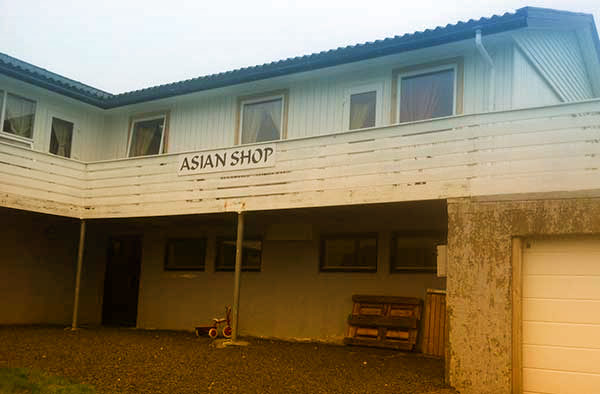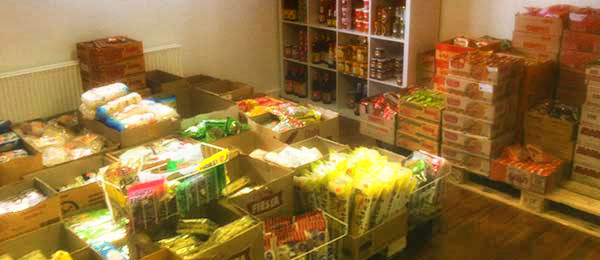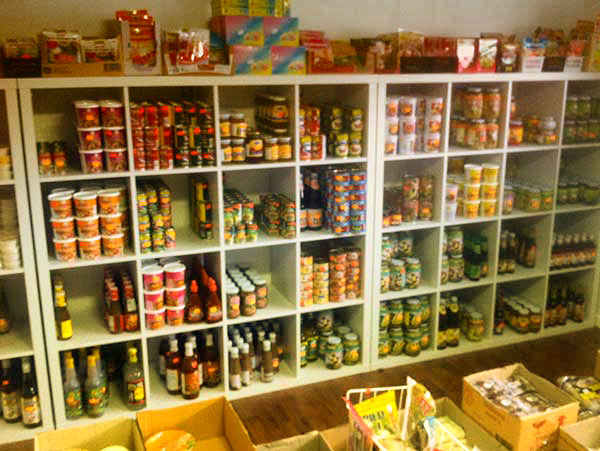
One of my favorite hobbies is simple wandering. I like to get lost in places… city or countryside, it doesn’t really matter. 2/3 of the time I walk around aimlessly, I stumble across something really cool and unexpected. This day in the Faroe Islands was no exception.
I was exploring Sandavágur, probably the prettiest little village in the Faroes, strolling the backstreets and alleyways. There’s not much going on there (outside of its annual festival or local football matches). Sandavágur always wins Scandinavian awards for being green and peaceful though, and it is ridiculously pretty (even when the weather is sucky and gray) — so it’s nice to absorb.
After a couple hours of walking, I was rounding my very last corner on the furthest-back street when I saw an unassuming white house with a trampoline out front. There was a beige van parked in the driveway, soccer mom-esque. This home had absolutely no notable features in its construction or presence, save for one thing: a tiny white sign with simple black letters, stating:
“ASIAN SHOP”

‘Huh,’ I thought as I waddled toward the door. There were no discernible lights on inside, and no movement to suggest that anyone was home. Pretty strange vibes. An older Faroese man with a spade was walking by (and staring at me), so I asked him if this was a place I could enter. Understanding (but unable to respond), he smiled and walked over to the door. *Knock knock*
Silence…then light, quick footsteps... A Filipino woman swung the door open, almost laughing as she greeted the old man in Faroese. After a quick exchange, she turned to me and said ‘Hello! Where are you from? Wow, it’s a long way from New York! I’m Neyli, please come in!’
Inside was a foyer lit with warm under-lights that reminded me of a nice sushi bar. Excited for a visitor, Neyli, brimming with energy and wit, lead me down a hallway to a fluorescent offshoot from her home. As we rounded a corner, I was met by stacks upon stacks of imported Thai, Chinese, and Vietnamese snacks. Everything from tom yum to fish balls. Surprised, I asked Neyli her story:

“On the Faroe Islands, we have about 300 Thai immigrants and about 100-150 Filipinos. I sell these products either individually or in bulk to them. I’m the only one who imports Asian goods here, so I know most everyone in the community. I also cater Asian food to Faroese businesses that want to bring in an exotic, unusual taste.
We Filipino are not picky — we can adapt to the Faroese cuisine and go a long time without tastes from home. The Thai community though, I think not so much. They start to miss Thai food and the flavors they grew up with. So they come here and I’m their solution! We have soups, sauces, and fish balls…”

I bought a bowl of instant tom yum to take on the road, and thanked Neyli for showing me her store. Curious, I later asked some Faroese friends if they knew about Asian Shop and the Thai/ Filipino communities. Most had never heard of the place — they chuckled at the randomness when I shared my photos — but a couple had more information, adding to the tale:
‘Neyli is an… interesting lady… she may have some power in deciding which Asian immigrants are accepted into the community. I think she does a lot of good for everyone — but maybe her history of imports has her involved with customs and immigration too? All I’m saying is that Faroese immigration is infamously tough, but it seems less so for a few nationalities [Filipino, Thai]. And I’ve heard that when these people get into challenging situations, like trying to get relatives visas, they’d rather she not know about it.’
And then, just when I thought the Case of the Shop couldn’t get any more curious, another Faroese friend later chimed in: ‘Yeah, it is almost impossible to be granted permanent residency in the Faroe Islands — I have a European friend who is fluent in 5 languages, conversational in Faroese, a university graduate, and has specific business interests. She’s like the ideal foreigner our government should be allowing in — and they’ve denied her several times. No one makes it in, UNLESS they are Thai or Filipino. For whatever reason, it’s easier for them.’
This article by the Danish Online Post reports that due to a lack of women on the Faroe Islands, the locals are “importing” Filipinos and Thais, and that men outnumber women dramatically — perhaps there is more to Asian Shop than meets the eye?
Hi Nate !
It’s good to read the story about the Asian Shop 🙂
This reminds me a lot of good souvenir.
Thank you !
Talk to you soon 😉
Take care
Guillaume.
This is a great article and has really helped me out on a paper I am writing.
Thank you for doing such solid work.
Thanks for the comment Colin! Glad this article helped. Will your paper be published anywhere online? I’m very curious to know the topic.
Sandavágur is not a little village. It is a big village – in a Faroese context 😉
There’s also a thai shop on Svalbard and IIRC in Nuuk, Greenland.
The immigration thing is quite straightforward: Either you are a Nordic citizen (free entry), or you already have a contract at a Faroese company (setting up your own business is no valid reason to enter) plus paperwork, or you marry yourself into the community. Thai and Filipino rule the seven seas; they can be found on any ship everywhere, also on Faroese ships and therefore in Faroese communities. But most of them simply marry a Faroese husband. Only real marriage, no registered parterships, count I believe.